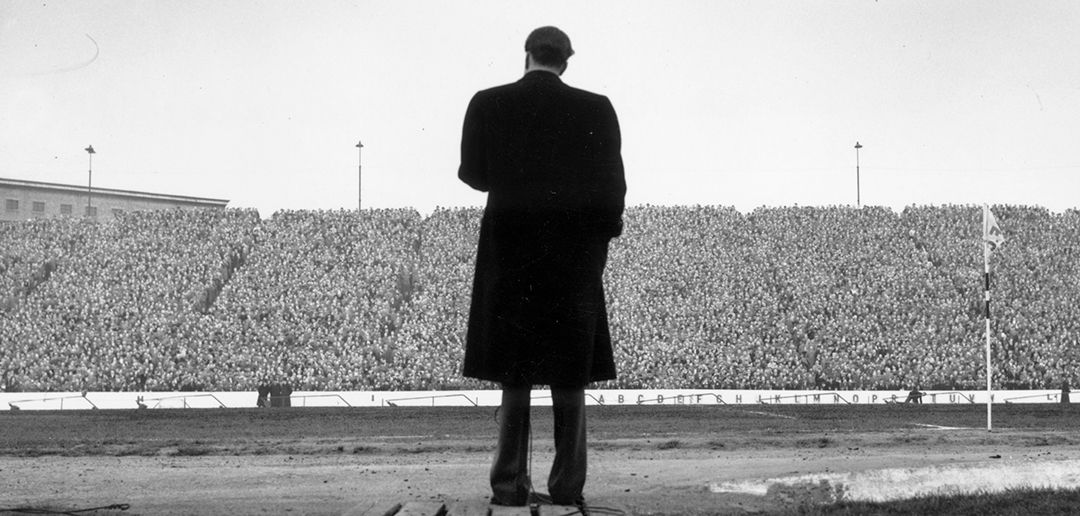In the late 1980s, I was a college freshman in the midst of a search for meaning and turning over every stone to find it. A few months previously, I’d been unceremoniously cut from the Kent State basketball team, and now I was lost without a light to see my next step.
The reasons I’d been cut are irrelevant to this piece, but being released took away the central idol I’d organized my life around, and now I was both free and forced to find some other reason to live. This was back when people still believed “meaning” was a prerequisite for engaging a new day, before the nihilism of Postmodern thought won out, and I desperately needed a reason “why?” to justify getting up every day to pursue my “what?”.
Get our "Top Articles" sent to your inbox weekly.
One day I found myself sitting in my Resident Director’s room, flipping through the handful of channels available on our cableless system back in the day, waiting for him to return from somewhere down the hall.
I stopped on a broadcast featuring a mass of people collected in a stadium somewhere, assuming it to be a game of some sort. Instead, I heard the booming voice of Rev. Billy Graham, a figure whose celebrity I was familiar with though I’d never actually listened to him and couldn’t tell you anything about the message that made him famous. I immediately changed the channel, but after hearing a few of the things he said, I felt strangely compelled to put Graham back on. Both surprising and fighting everything within myself—I did.
I got up and looked down the hallway to see if my RD was coming and to make sure no one was listening, as I could imagine nothing less cool as a college freshman than to be caught listening to Billy Graham in someone’s dorm room.
But what I heard him say in those few minutes before my RD came back helped change my life, and upon hearing that Graham had died on February 21 at age 99, I was filled with gratitude—along with countless other millions—for the fulfillment of his life and calling to ministry.
He are five reasons I came to appreciate Billy Graham, five characteristics I’ve needed to be true of anyone who would impact my life spiritually:
He understood the heart of an athlete
Long before current pastors like Tim Keller popularized identifying and extracting idols from our hearts, Graham was prophetically calling out the deeply entrenched idols of twentieth-century America—money, sex, and power. He understood how the heart and mind could get so wrapped around aspects of God’s creation that they become idols, and he had no problem pointing those idols out for people who otherwise wouldn’t realize they were worshipping them.
Three days before he died and in lieu of the Olympics taking place, his son Franklin posted a message of his father speaking at a past evangelistic event describing the idol that sports can become in the heart of an athlete.
Years ago, my father @BillyGraham shared some interesting findings about a survey taken of 198 world class athletes. Is athletic success and a gold medal more valuable than life itself? You’ll be shocked to hear what many answered. #Olympics pic.twitter.com/ef8clsLxi3
— Franklin Graham (@Franklin_Graham) February 18, 2018
In his message, Graham said, “The sports researcher Robert Goldman polled 198 world class athletes, asking: ‘Would you take a pill that would guarantee a gold medal even if you knew that it would kill you in five years?’ Do you know what the answer was? More than half said they’d do it. In other words, they want athletic success and they want that gold medal more than life itself.”
Rev. Graham went on to quote Mark 8:36, “For what shall it profit a man if he shall gain the whole world and lose his own soul?...Deep in your heart you know something is missing, and you don’t know what it is. God is speaking to you. Do you know Him?”
Graham wasn’t against sports. He wasn’t against competitive athletes disciplining themselves for a worldly prize. But like all of God’s prophets throughout history, he WAS against anything that took the place of God in our hearts, and he understood the psyche of an athlete that made him/her susceptible to bowing to sports instead of the Creator.
He explained the gospel clearly
What I heard in the dorm room that day in just a few minutes was the same message Graham preached for the entirety of his life: “Something is broken in your heart. It’s called ‘sin.’ God punishes sin, but because God loves you He provided Jesus to take the punishment in your place. You must choose to receive the sacrifice Jesus made and make it your own. Choose Jesus! Now go and let Him live through you in practical ways for the rest of your life on earth.”
No theatrics—save for a finger aggressively but randomly pointing at his audience.
No cleverness—except for using some cultural launching point into his message.
No phoniness or attempt to appear something other than he was. Just the straight message of the gospel, a message that could both cut through the secular sophistication of a college classroom and also clear away the cobwebs of a murky, confused mind.
He wasn’t hard to follow. He didn’t try to be overly interesting. He just preached the gospel so you knew exactly what you were accepting or rejecting.
He believed in the relevance of sin
He didn’t feel burdened to make the gospel relevant to his audience—if explained clearly he knew it already and always would be. He understood the corrupt state of our world and that every individual desperately needs God’s intervention to be made spiritually well and ultimately whole.
Unlike coaches who change their game plan every week based on the problems they believe an opposing team will attempt to create, Graham never wavered from “sin” as a central, sad, and shared truth of human existence, the only real problem facing everyone everyday.
Stop talking about sin, and suddenly you have to use verbal gymnastics to help people see any need for the gospel. But Graham believed that although spiritual burdens will manifest themselves in any number of ways—politically, socially, interpersonally—they always originate from a condition the Bible calls sin that must be addressed. If sin remains the central problem, then Jesus becomes the only answer and against this backdrop, the gospel is always relevant.
So he made a life of preaching and unpacking and explaining the nuances of sin across Western cultures and around the world, even as that word became more and more offensive and antiquated heading into the twenty-first century. And—just as offensive—he preached Jesus as the antidote.
He spoke the truth to power
Access to privilege and power does strange things to people. Anyone familiarized with the scandals of Hollywood and Washington, of professional sports programs and Fortune 500 companies, of big cities and big churches, should appreciate how difficult it is to keep a straight head when it starts to fill with lustful opportunity or the threat of losing status.
How easy to lose one’s prophetic voice when faced with losing season tickets, an invitation to a state dinner, a seat on Air Force One, or across from Larry King?
Anyone participating in today’s collegiate or professional sports culture knows how difficult it can be to tell the truth to a head coach or to an athletic department administrator or a team owner, knowing the consequences could include losing status in the program—or job altogether. Most sports scandals in the news these days arise because someone has an opportunity to confront a power broker with uncomfortable truth early on and either fails to do so or tames the message to such an extent that it becomes toothless and unthreatening.
But Graham never seemed to change his message with the powerful. Who can have an audience with every US President since Truman, dine with world leaders like a welcomed neighbor, converse with power brokers on a national stage and not succumb to trading in “Thus saith the Lord” for some compromised message? Very few.
He resisted believing his own press
Today, with self-absorption practically celebrated as a virtue, many young athletes have whatever humility naturally exists in their hearts drained away by the time they become teens. Now that we’ve fully accepted “My self-interest and advancement and happiness are all that matter, so everyone and everything else is second to me fully realizing me” as a noble mind-set, what Graham represents seems all the more otherworldly.
A man called “America’s pastor” throughout his life was still heralded upon his death with labels like “humble evangelist,” “humble warrior,” and “humble servant.” To live 99 years and dine with kings and queens and Presidents across seven decades, and still get to the end with folks seeking creative ways to use the adjective “humble” in conjunction with your name is nothing short of a miracle in itself.
Billy Graham was just a man, but he was a man who showed the world for a century what it looks like to be consumed with doing the will of God and only worrying about being pleasing to Him.
And this former athlete will always be thankful that he did.














